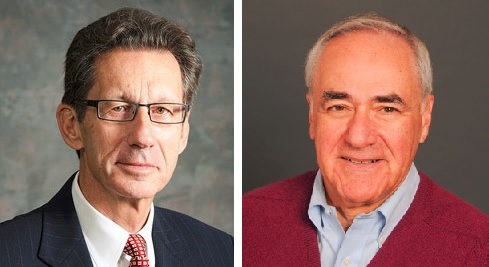Access to Justice Fellows making legal aid more accessible to veterans

On any given night, there are 1250 homeless veterans sleeping on the streets of Massachusetts. Many of them are grappling with mental illness and substance abuse issues due to post-traumatic-stress disorder (PTSD), traumatic brain injury (TBI), and other invisible wounds of war. Often their struggles have caused them to lose their jobs, their homes, and the support of their families.
But homelessness isn’t the only issue facing these men and women. Their injuries and subsequent problems often lead to legal trouble.
“They need legal help on a number of different fronts, with custody, with divorce, with benefits appeals, debt, eviction, trying to find housing. As you can imagine, if you’re in a depressed condition and having a lot of difficulty, it is extraordinarily difficult to come out of the tunnel,” says Allan Taylor, an Access to Justice Fellow and Vietnam veteran who is spending his Fellowship volunteering with the Veterans Treatment Court.
The Veterans Treatment Court is a relatively new program designed to help veterans who have been charged with criminal offenses. Participants who are invited to join are provided with a mentor and are required to report weekly to either Judge Mary Hogan Sullivan or Judge Eleanor Sinnott, who is herself a veteran. Their progress is tracked by a team that includes a probation officer, a psychologist, and a social worker, and participants who graduate from the eighteen month program are cleared of their criminal charges. The Treatment Court is currently run out the Dedham District Court and the Edward W. Brooke Courthouse in Boston, with plans to expand to Framingham this year.
While veterans taking part in the Treatment Court are receiving help for their criminal problems, Taylor found that many of them are also facing civil legal issues without support. He is working to create a pilot program wherein participants can access civil legal assistance at the court. He hopes volunteer attorneys from organizations such as MetroWest Legal Services will donate some of their time to provide in-person aid to program participants, who, due to their injuries and psychological problems, often have difficulties getting around.
While Taylor gets his pilot program off the ground, Fellow Jordan Krasnow is volunteering with Veterans Legal Services (VLS), a nonprofit that provides civil legal aid to homeless and low-income veterans. The organization’s three staff attorneys, along with other volunteers from area firms and law schools, hold weekly legal clinics at a number of area shelters, allowing veterans to access services they may not seek out on their own.
Forty to fifty percent of VLS clients are Vietnam-era veterans, but staff say the number of veterans from Iraq and Afghanistan who are homeless or at-risk has more than tripled over the past five years. The profile of the average VLS client is shifting as these men and women return from combat.
Since receiving a Root Cause Social Innovator grant in 2014, VLS has entered a period of immense growth. Krasnow is spending his Fellowship assisting the organization with governance during this transition period. He joined the Board of Directors and is working to review documents, create committees, lead board member evaluations, and conduct outreach to find new board members.
“It’s a tremendous group – it’s really in a place where it’s taking off and a lot of good things are happening,” Krasnow says.
Krasnow recently spoke about his Fellowship at one of the monthly meetings held by the Fellows Program. He explained that he was drawn to veterans’ issues while looking for a volunteer project after his retirement because he felt underserved veterans were a “big priority.” He was familiar with VLS because of their work with two of his colleagues, Fellows Rosemary Allen and Dick Allen, who have helped the organization expand their volunteer attorney program and deal with nonprofit law matters.
Veterans issues have received increased coverage over the past few years, as hundreds of thousands of men and women return home from Iraq and Afghanistan to find lacking resources and underfunded support programs. The Office of Veterans Affairs has even outlined a long-term plan to end veteran homelessness and has launched initiatives in many states. But Taylor and Krasnow agree that veterans’ issues have been falling through the cracks for decades.
Krasnow believes that because there was so much happening politically during the Vietnam era, veterans ended up being largely ignored. It is only now, in the age of worldwide connectivity, that people can see firsthand how veterans have been affected.
Taylor cites mental health stigma as one of the biggest causes. He says the psychological scars worn by veterans were perceived to be character flaws during the Vietnam War. Though society now understands the major effects of PTSD, TBI, and other mental health problems facing veterans, we are, he says, only just starting to take baby steps to address the issue.
As we continue taking these small steps to right our societal wrongs, Taylor believes the next generation of lawyers can play a big role.
“The world is becoming more and more complicated, business is becoming more and more expensive, and more and more people are getting left behind,” he says. “Be sure to make [the legal] system a lot more inclusive.”
The Access to Justice Fellows Program, a joint program of the Lawyers Clearinghouse and the Massachusetts Access to Justice Commission, was started in 2012 and recently entered its third year with the largest class of Fellows so far. Sixteen retired and transitioning lawyers have taken on a variety of pro bono projects related to veterans’ issues, child welfare, the health of vulnerable populations, civil liberties, and other access to justice matters. Click here to learn more about past and present Fellows.